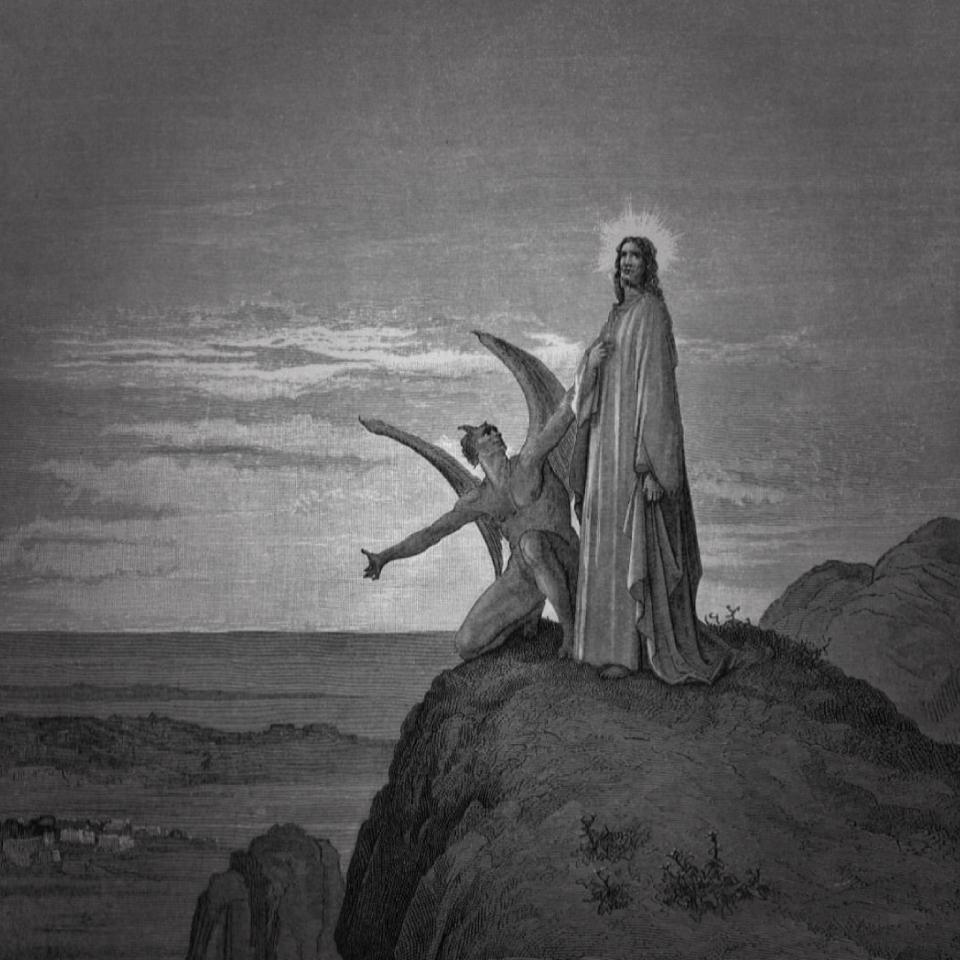Welcome to Lent.
Desert and dry, mean and gritty, Lent is the realm of sacrifice and privation. In my mind’s eye, Lent has always engendered a misplaced Advent image: the wild-eyed, locust-eating John the Baptist hectoring civilized society to “Make straight the way of the Lord!” Lent is Gustave Dore’s chilling image of Satan squatting on a precipice while sweeping his arm across the landscape. “All these,” he whispered with perfect tongue to the weary, hungering Christ, “I shall give to you, if you will prostrate yourself and worship me.” Lent is Spirit fighting Flesh. It is gall and wormwood. It is Memento Mori. Ravenous Death is coming for your Christ, we are reminded. And Death is coming for you.
Death, in the eyes of W.H. Auden, blackens everything. In his immortal poem, Funeral Blues, he bitterly mourns,
The stars are not wanted now; put out every one,
Pack up the moon and dismantle the sun,
Pour away the ocean and sweep up the wood;
For nothing now can ever come to any good.
Lamenting the hollowed residual remaining after another’s death, John Donne ached in For Whom the Bell Tolls,
Each man’s death diminishes me,
For I am involved in mankind.
Therefore, send not to know
For whom the bell tolls,
It tolls for thee.
And in his poem, A Call, Seamus Heaney finds Death devious, unfeeling, shocking. Like a mundane afternoon phone call when you are weeding the garden, Death comes:
So I saw him
Down on his hands and knees beside the leek rig,
Touching, inspecting, separating one
Stalk from the other, gently pulling up
Everything not tapered, frail and leafless,
Pleased to feel each little weed-root break,
But rueful also…
And found myself thinking; if it were nowadays,
This is how Death would summon Everyman.
I would like to be reassuring. I would like to say that this is decidedly not what Lent is. But I can’t. This is Lent. Lent is the Via Dolorosa, the black and crippling walk to the cross. In the wonderful Lenten Devotional Remember Your Death, Sister Theresa Aletheia Noble, with skull on desk like the saints of old, insists that our true purification comes with an honest reckoning: Death comes for us all and often at a time not of our choosing. As I daily read this book, it is difficult not to have my mind concentrated and hear the haunting cadence of the “clattering train” of Edwin James Milliken’s poem, Death and His Brother Sleep,
A hundred hearts beat placidly on,
Unwitting they that their warder’s gone;
A hundred lips are babbling blithe,
Some seconds hence they in pain may writhe.
For the pace is hot, and the points are near,
And Sleep hath deadened the driver’s ear;
And signals flash through the night in vain.
Death is in charge of the clattering train!
No, there is no reasoning away Death. In the end, there it is.
Except…
Except that what we must not forget is that, in the very end, Death isn’t all. There is something beyond it. Oh, the grave is proud and hungry to swallow us. But it will ultimately go unsatisfied. For all of Satan’s defiant glee and all of the haughty howling of a million demons, the whip marks, the thorny lacerations, and the nail piercings of the Christ did not yield the death of God, but instead ushered in his eternal victory. Lent ends not with Good Friday, but through the Triduum points to Easter Sunday. As Pope Benedict XVI wrote so well,
If [the Resurrection] were taken away, it would still be possible to piece together from the Christian tradition a series of interesting ideas about God and men, about man’s being and his obligations, a kind of religious world view: but the Christian faith itself would be dead. Jesus would be a failed religious leader, who despite his failure remains great and can cause us to reflect. But he would then remain purely human, and his authority would extend only so far as his message is of interest to us. He would no longer be the criterion: the only criterion left would be our own judgment in electing from his heritage what strikes us as helpful. In other words, we would be alone. Our own judgment would be the highest instance.
To be sure, Lent is a desert time. It is ashes and hunger. It is mean and biting. But it ushers in eternity. We are not alone in our suffering and sacrifice. No, we are not.
Christ is here.
Welcome to Lent.
